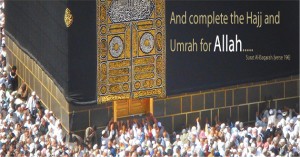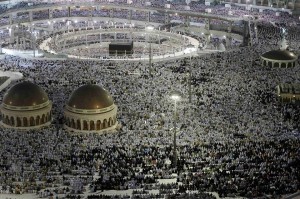Originally posted 2020-07-16 00:00:53.
Almighty Allah has made Islam, the final religion, an invincible stronghold against the aberrations and falsehoods of the perverted religions. The whole rituals, beliefs, ethics, and etiquette of Islam marked the Islamic uniqueness and its dissimilarity from the corrupted doctrines and practices of infidels and disbelievers. Islamic rites came distinctly different from the blemished worshipping acts of the peoples of other religions.
The Prophet (peace be upon him) was keen to accentuate this religious variance by enhancing the Islamic practice and dispensing with the fabricated acts of ignorant religions.
This dissimilarity is by no means a cause of conflict and clash between religions, rather it enriches the Islamic uniqueness and singularity that distinguishes the last chosen religion of God, Islam.
The ritual of Hajj manifests that Islamic uniqueness. Every ritual of Hajj sustains the unlikeness of Islam to the former doctrines of disbelief, which is clear from the Qur’an and the reports from the Prophet (peace be upon him).
As known, the first place of worship that has been placed on the earth was the Ka`bah in Makkah. The Almighty God says,
Indeed, the first House [of worship] established for mankind was that at Makkah – blessed and a guidance for the worlds. (Aal `Imran 3:96)
It is said that the first one who built the Kabah is Adam not Ibrahim (peace be upon them both). The sound opinion about the well-known story of building the Kabah by Ibrahim and his son Ismail is that the Kabah was already built, and Ibrahim and his son (peace be upon them both) renewed it and raised its foundations after it was demolished. The evidence of this is the Quranic statement at the tongue of Ibrahim when he left his wife Hajar in the desert of Arabia saying,
Our Lord, I have settled some of my descendants in an uncultivated valley near Your sacred House, our Lord, that they may establish prayer. So make hearts among the people incline toward them and provide for them from the fruits that they might be grateful. (Ibrahim 14:37)
According to the verse, Ibrahim left his wife and son near the sacred House, which was there before there coming to Arabia. Then, Isma`il grew up, and they rebuilt the Ka`bah. Throughout the time, people would go to the Ka`bah and perform Hajj and `Umrah to it.
Before the coming of Prophet Muhammad (peace be upon him), people deviated from the path of God and worshipped idols, animals, ghosts, etc. and forsook the worship of the Creator of the Heavens and Earth. They put a lot of idols around the Ka`bah which they would circulate. Moreover, they would practice a number of devious acts when visiting Ka`bah for Hajj or Umrah. The Prophet destroyed these idols, rebelled all these acts and emphasized the unique Islamic identity and rituality. In the following points, we notice the Prophet’s keenness on the Islamic unique rituals that vary from those of disbelievers.

According to the verse, Ibrahim left his wife and son near the sacred House, which was there before there coming to Arabia.
- Standing at Arafat: The people of Quraish would not stand at `Arafat but they would stand at Al-Muzdalifah instead. Aishah said, “When Islam came, Allah commanded His Prophet to go to `Arafat and stand at it, then depart from it, as Almighty Allah says, “Then depart from the place from where [all] the people depart.” [Al-Baqarah 2:199] (Al-Bukhari) The Prophet (peace be upon him) intended to be dissimilar to the infidels. Muslim narrated from the hadith of Jabir that the Prophet moved on and Quraish has no doubt that he will stand at Al-Mash`ar Al-Haram, as they used to do in the Jahiliyyah (pre-Islamic time), but he continued until he reached Arafah.”
- Taking provisions for Hajj: Ibn `Abbas said, “The Yemenis used to go for Hajj without taking provisions and say, “We rely on people,” and when they reach Makkah they would beg people. Almighty Allah revealed, “…And take provisions, but indeed, the best provision is fear of Allah.” (Al-Baqarah 2:197)
- Prescribing Hajj Tamattu`: Ibn Hibban narrated from Ibn `Abbas that he said, “By Allah, the Prophet did not let `A’ishah make `Umrah during Dhul-Hijjah except to be dissimilar to the people of polytheism…”
- Using different form of talbiyah: In Sahih Muslim, the disbelievers used to recite in their talbiyah, “Labbayka la sharika lak, illa sharikan huwa lak, tamlikuhu wama malak,” (Here I am, there is no partner with you, except one partner that you owns and what he owns.) When he (the Prophet) heard them saying “There is no partner with you,” he would say, “Damn you! Enough! Enough!” So, Islam prescribed different and right talbiyah that says, “Labbayka Allahumma labbayk, labbayka la sharika laka labbayk. Inna al-hamd wal ni`mata laka wal mulk, la sharika lak,” (Here I am, O Allah, here I am. Here I am, You have no partner, here I am. Verily all praise and blessings are Yours, and all sovereignty, You have no partner).’” (Al-Bukhari)
- Moving out of Muzdalifah before sunrise: `Amr ibn Maymun said, “I witnessed `Umar offering the Subh (Fajr, Dawn) Prayer in Juma` (i.e. Muzdalifah) then stood and said, ‘The polytheist would not move out (of Muzdalifah) until sunrise and say ‘Let the sun rises upon you O Thubayr (a mountain),’ but the Prophet did not behave like them and moved out before the sun rises.” (Al-Bukhari)
- Remembering Allah during Hajj: Hajj was an occasion for vying in boasting of ancestors, reciting poetry and other things, but Allah has made it a time for remembering and worshipping Him. Ibn `Abbas said, “The people of Jahiliyyah would stand in the time of Hajj and one of them say, ‘My father would give food and blood money (on behalf of others).’ They did not have but boasting of their fathers’ deeds. Almighty Allah revealed upon Muhammad,
And when you have completed your rites, remember Allah like your [previous] remembrance of your fathers or with [much] greater remembrance. (Al-Baqarah 2:200)
So, Muslims were ordered to spend the time in worship, supplication and dhikr.
- Wearing the garment of Ihram: Ibn Jarir At-Tabari (may Allah confer mercy upon him) said, “A tribe from Yemen would circulate the House (the Ka`bah) naked. When it was said, ‘Why do you do so?’ They would reply ‘We found our fathers doing it, and Allah has ordered us to do it.’ When one of them arrives for Hajj or `Umrah he would say, ‘I should not circulate in a cloth in which I commit atrocity.’ He would say, ‘Who lends me an apron?’ Either he was given a cloth or he would go around the Ka`bah naked. So, Almighty Allah revealed that you hear, “…take your adornment at every masjid… (Al-A`raf 7:31)
Now we notice how the religion of Islam was keen on providing its own rituals that differed completely from the devious acts of the infidels and disbelievers.


